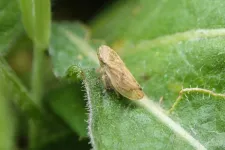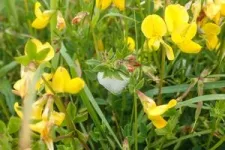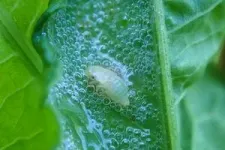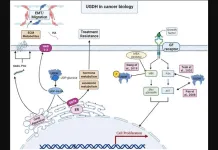(Press-News.org) New research fueled in part by citizen scientists reveals that the meadow spittlebug—known for the foamy, spit-like urine released by its nymphs—can feed on at least 1,300 species of host plants, more than twice the number of any other insect.
The study, which is published today in the journal PLOS ONE, could be especially important in the effort to stop the bug from spreading a type of bacterium that has caused the death of crops across the world, including olive trees in Italy, grapevines in California, citrus trees in South America, and almond trees in Spain.
“Thirteen hundred host plants means 1,300 opportunities to spread pathogenic bacteria in natural and agricultural environments, a sobering wake-up call,” said the study’s lead author Vinton Thompson, a research associate in the Museum’s Division of Invertebrate Zoology.
Meadow spittlebugs (Philaenus spumarius), also called froghoppers, suck sap from plants with straw-like mouthparts, picking up bacteria along the way and becoming vectors for plant diseases. Most recently, the bugs have been found to spread the bacterium Xylella fastidiosa, a pathogen that has decimated olive groves in the Apulia region of Italy. To predict what other plant species and ecosystems are at risk, scientists must understand the vector’s host range. Thompson, who has been studying and documenting host plants of spittlebugs for 50 years, set out to do that along with collaborators in the United Kingdom.
The scientists combined data from published literature, host records associated with museum specimens, observations, and data from a citizen science effort carried out in Britain called BRIGIT, which ran from 2019-2021 to help prepare for the possible introduction of X. fastidiosa to the UK.
Meadow spittlebugs have a wide geographical range and can thrive in drastically different climates, from Hawaii to just south of the Arctic Circle. Scientists have suspected for some time that this bug had more hosts than any other insect, but the number they calculated was startling: the meadow spittlebug feeds on more than 1,300 species of plants across 117 families—a world record for insects. These plant species include ferns, herbs, shrubs, vines and trees, annuals and perennials, grasses and forbs, plants of the tropics, subtropics, temperate and boreal zones, and conifers. The researchers found that the insect with the second-highest number of plant hosts is the fall webworm, a moth that is known to feed on 636 different plant species.
“The spittlebug is the ultimate herbivore champion,” said study author Claire Harkin, from the University of Sussex. “It will feed on just about every imaginable kind of vascular plant except those submerged in aquatic environments.”
Why do meadow spittlebugs have so many more host plants? More research is needed, but the scientists suspect it’s due to the bugs’ preference for sap from the xylem, which is the main water-carrying structure of the plant. Most sap-eating bugs feed from the plant’s phloem, which is the tissue that transmits sugar and other metabolic compounds. Unlike sap from the phloem, the liquid in the xylem is similar across a diverse range of host plants.
“These bugs feed on almost anything they can get at with their mouth parts,” Thompson said. “Unfortunately, that means there is tremendous potential for the spread of X. fastidiosa in natural ecosystems if it’s introduced. This review is just the first step in thinking about how to control this bug and the diseases it spreads.”
The meadow spittlebug is no stranger to superlatives: it is the highest jumping insect proportional to body size and has the largest measured sucking power of any bug—strong enough that it could suck the water out of a cup at the base of the Statue of Liberty while perched on its crown. It also is exceptional at urination, excreting the human equivalent of 2,500 gallons of urine a day.
ABOUT THE AMERICAN MUSEUM OF NATURAL HISTORY (AMNH)
The American Museum of Natural History, founded in 1869 with a dual mission of scientific research and science education, is one of the world’s preeminent scientific, educational, and cultural institutions. The Museum encompasses more than 40 permanent exhibition halls, galleries for temporary exhibitions, the Rose Center for Earth and Space including the Hayden Planetarium, and the Richard Gilder Center for Science, Education, and Innovation. The Museum’s scientists draw on a world-class permanent collection of more than 34 million specimens and artifacts, some of which are billions of years old, and on one of the largest natural history libraries in the world. Through its Richard Gilder Graduate School, the Museum offers two of the only free-standing, degree-granting programs of their kind at any museum in the U.S.: the Ph.D. program in Comparative Biology and the Master of Arts in Teaching (MAT) Earth Science residency program. Visit amnh.org for more information.
END
Meadow Spittlebug’s record-breaking diet also makes it top disease carrier for plants
New study finds that the meadow spittlebug can feed on more than 1,300 plants, revealing scope of its capacity to spread incurable plant disease to crops
2023-10-04
ELSE PRESS RELEASES FROM THIS DATE:
Keshav Pingali to receive ACM-IEEE CS Ken Kennedy Award
2023-10-04
ACM, the Association for Computing Machinery, and IEEE Computer Society have named Keshav Pingali, the W.A.”Tex” Moncrief Chair of Grid and Distributed Computing at the University of Texas at Austin, as the recipient of the 2023 ACM-IEEE CS Ken Kennedy Award. The Ken Kennedy Award recognizes groundbreaking achievements in parallel and high performance computing. Pingali is cited for contributions to high-performance parallel computing for irregular algorithms such as graph algorithms. He is also cited for leadership on the Galois Project, which provides a unifying framework for parallelizing both irregular and regular algorithms.
Pingali has made deep and wide-ranging ...
Pandemic boosted gardening, hunting in NYS
2023-10-04
A survey of New York state residents found that nearly half of respondents increased the amount of time they spent on wild and backyard food in the early months of the COVID-19 pandemic, confirming anecdotes about increases in activities such as sourdough baking, fishing and gardening. People also tended to eat the food they produced, researchers found, possibly buffering the generally less healthful eating that was common at the time.
“This was the period of 2020 when you couldn't find tomato cages, seeds were out of stock, and there were reports about record numbers of people hunting and ...
Study identifies jet-stream pattern that locks in extreme winter cold, wet spells
2023-10-04
Winter is coming—eventually. And while the earth is warming, a new study suggests that the atmosphere is being pushed around in ways that cause long bouts of extreme winter cold or wet in some regions.
The study’s authors say they have identified giant meanders in the global jet stream that bring polar air southward, locking in frigid or wet conditions concurrently over much of North America and Europe, often for weeks at a time. Such weather waves, they say, have doubled in frequency since the 1960s. In just the last few years, they have killed hundreds of people and ...
Department of Defense grant awarded to study metastasis in bladder cancer
2023-10-04
A Weill Cornell Medicine researcher has received a $610,000 grant from the Department of Defense to investigate the mechanisms causing DNA instability that potentially drives metastasis in bladder cancer. The research also aims to identify methods to intercept this spread. The Peer-Reviewed Cancer Research Program (PRCRP) Idea Award funds innovative, high-risk, high-reward basic cancer research. One of the goals of the PRCRP program is to decrease the burden of cancer on service members and their families, veterans, and the American public.
“Approximately 40% of patients with muscle-invasive bladder cancer develop metastases, where ...
Simultaneous large wildfires will increase in Western U.S.
2023-10-04
Contacts:
David Hosansky, UCAR/NCAR Manager of Media Relations
hosansky@ucar.edu
720-470-2073
Audrey Merket, UCAR/NCAR Science Writer and Public Information Officer
amerket@ucar.edu
303-497-8293
Simultaneous outbreaks of large wildfires will become more frequent in the Western United States this century as the climate warms, putting major strains on efforts to fight fires, new research shows.
The new study, led by scientists at the National Center for Atmospheric Research (NCAR), focused on wildfires of 1,000 acres or larger. It found that wildfire seasons in which ...
New UCF technology could reduce lag, improve reliability of online gaming, meetings
2023-10-04
Whether you’re battling foes in a virtual arena or collaborating with colleagues across the globe, lag-induced disruptions can be a major hindrance to seamless communication and immersive experiences.
That’s why researchers with the University of Central Florida’s College of Optics and Photonics (CREOL) and the University of California, Los Angeles, have developed new technology to make data transfer over optical fiber communication faster and more efficient.
Their new development, a novel class of optical modulators, is detailed in a new study published recently in the journal Nature Communications. Modulators can be thought of as like a light switch that controls certain ...
Rice alum Louis Brus awarded Nobel Prize in Chemistry
2023-10-04
Rice University alumnus Louis Brus (’65) has been awarded the Nobel Prize in Chemistry for the “discovery and development of quantum dots,” nanosized particles with unique properties “that now spread their light from television screens and LED lamps,” according to a Royal Swedish Academy of Sciences announcement today.
Brus, who started his undergraduate education at Rice in 1961, shares the distinction with Moungi Bawendi and Alexei Ekimov. Their work has been crucial to the development of nanotechnology, which has helped drive major computing ...
UGDH in clinical oncology and cancer biology
2023-10-04
“Given the potential challenges of directly inhibiting UGDH, therapeutic strategies may extend to targeting downstream pathways and upstream substrates.”
A new review paper was published in Oncotarget's Volume 14 on September 28, 2023, entitled, “UDP-glucose dehydrogenase (UGDH) in clinical oncology and cancer biology.”
UDP-glucose-6-dehydrogenase (UGDH) is a cytosolic, hexameric enzyme that converts UDP-glucose to UDP-glucuronic acid (UDP-GlcUA), a key reaction in hormone and xenobiotic metabolism and in the production of extracellular matrix precursors.
In this review, researchers Meghan J. Price, Annee D. Nguyen, Jovita K. Byemerwa, ...
Prehistoric people occupied upland regions of inland Spain in even the coldest periods of the last Ice Age
2023-10-04
Paleolithic human populations survived even in the coldest and driest upland parts of Spain, according to a study published October 4, 2023 in the open-access journal PLOS ONE by Manuel Alcaraz-Castaño of the University of Alcalá, Spain, Javier Aragoncillo-del Rió of the Molina-Alto Tajo UNESCO Global Geopark, Spain and colleagues.
Research into ancient hunter-gatherer populations of the Iberian Peninsula has mainly focused on coastal regions, with relatively little investigation into the inland. A classic hypothesis has been that the cold and dry conditions of inland Iberia ...
Antimicrobials don't appear to help pet dogs with uncomplicated diarrhea - so should likely be prescribed less often by vets - according to new causal inference study
2023-10-04
Antimicrobials don't appear to help pet dogs with uncomplicated diarrhea - so should likely be prescribed less often by vets - according to new causal inference study
###
Article URL: https://journals.plos.org/plosone/article?id=10.1371/journal.pone.0291057
Article Title: Target trial emulation: Do antimicrobials or gastrointestinal nutraceuticals prescribed at first presentation for acute diarrhoea cause a better clinical outcome in dogs under primary veterinary care in the UK?
Author Countries: UK
Funding: CP is supported at the RVC ...
LAST 30 PRESS RELEASES:
Pekingese, Shih Tzu and Staffordshire Bull Terrier among twelve dog breeds at risk of serious breathing condition
Selected dog breeds with most breathing trouble identified in new study
Interplay of class and gender may influence social judgments differently between cultures
Pollen counts can be predicted by machine learning models using meteorological data with more than 80% accuracy even a week ahead, for both grass and birch tree pollen, which could be key in effective
Rewriting our understanding of early hominin dispersal to Eurasia
Rising simultaneous wildfire risk compromises international firefighting efforts
Honey bee "dance floors" can be accurately located with a new method, mapping where in the hive forager bees perform waggle dances to signal the location of pollen and nectar for their nestmates
Exercise and nutritional drinks can reduce the need for care in dementia
Michelson Medical Research Foundation awards $750,000 to rising immunology leaders
SfN announces Early Career Policy Ambassadors Class of 2026
Spiritual practices strongly associated with reduced risk for hazardous alcohol and drug use
Novel vaccine protects against C. diff disease and recurrence
An “electrical” circadian clock balances growth between shoots and roots
Largest study of rare skin cancer in Mexican patients shows its more complex than previously thought
Colonists dredged away Sydney’s natural oyster reefs. Now science knows how best to restore them.
Joint and independent associations of gestational diabetes and depression with childhood obesity
Spirituality and harmful or hazardous alcohol and other drug use
New plastic material could solve energy storage challenge, researchers report
Mapping protein production in brain cells yields new insights for brain disease
Exposing a hidden anchor for HIV replication
Can Europe be climate-neutral by 2050? New monitor tracks the pace of the energy transition
Major heart attack study reveals ‘survival paradox’: Frail men at higher risk of death than women despite better treatment
Medicare patients get different stroke care depending on plan, analysis reveals
Polyploidy-induced senescence may drive aging, tissue repair, and cancer risk
Study shows that treating patients with lifestyle medicine may help reduce clinician burnout
Experimental and numerical framework for acoustic streaming prediction in mid-air phased arrays
Ancestral motif enables broad DNA binding by NIN, a master regulator of rhizobial symbiosis
Macrophage immune cells need constant reminders to retain memories of prior infections
Ultra-endurance running may accelerate aging and breakdown of red blood cells
Ancient mind-body practice proven to lower blood pressure in clinical trial
[Press-News.org] Meadow Spittlebug’s record-breaking diet also makes it top disease carrier for plantsNew study finds that the meadow spittlebug can feed on more than 1,300 plants, revealing scope of its capacity to spread incurable plant disease to crops








